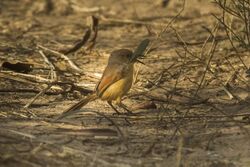Biology:Red-winged warbler
| Red-winged warbler | |
|---|---|

| |
| Scientific classification | |
| Domain: | Eukaryota |
| Kingdom: | Animalia |
| Phylum: | Chordata |
| Class: | Aves |
| Order: | Passeriformes |
| Family: | Cisticolidae |
| Genus: | Prinia Sharpe, 1903 |
| Species: | P. erythroptera
|
| Binomial name | |
| Prinia erythroptera (Jardine, 1849)
| |
The red-winged warbler or the red-winged prinia (Prinia erythroptera) is a bird species in the family Cisticolidae. It formerly belonged in the monotypic genus Heliolais.[1] It is found in Benin, Burkina Faso, Cameroon, Central African Republic, Chad, Democratic Republic of the Congo, Ivory Coast, Ethiopia, Gambia, Ghana, Guinea, Guinea-Bissau, Kenya, Liberia, Malawi, Mali, Mozambique, Niger, Nigeria, Senegal, Sierra Leone, Sudan, Tanzania, Togo, Uganda, Zambia, and Zimbabwe, where its natural habitat is dry savanna.[2]
Taxonomy
The red-winged warbler was described by the Scottish naturalist William Jardine in 1849 under the binomial name Drymoica erythroptera. The type locality is West Africa.[3][4] The specific epithet erythroptera comes from the Ancient Greek eruthros for "red" and -pteros, "-winged".[5]
There are four subspecies:[1]
- P. e. erythroptera (Jardine, 1849) – Senegal to northern Cameroon
- P. e. jodoptera (Heuglin, 1864) – central Cameroon to southern Sudan and northwestern Uganda
- P. e. major (Blundell & Lovat, 1899) – Ethiopia
- P. e. rhodoptera (Shelley, 1880) – Kenya to eastern Zimbabwe and Mozambique
Most taxonomists place this species in the genus Prinia rather than in its own monotypic genus Heliolais.[6][7] Support for this alternative placement is provided by a molecular phylogentic study of the Cisticolidae published in 2013 that found that the red-winged warbler was closely related to the prinias.[8]
References
- ↑ 1.0 1.1 Gill, Frank; Donsker, David, eds (2017). "Grassbirds, Donacobius, Malagasy warblers, cisticolas & allies". World Bird List Version 7.3. International Ornithologists' Union. http://www.worldbirdnames.org/bow/grassbirds/. Retrieved 26 August 2017.
- ↑ Cite error: Invalid
<ref>tag; no text was provided for refs namedIUCN - ↑ Jardine, William (1849). Contributions to Ornithology for 1849. Edinburgh: W.H. Lizars. p. 15. https://www.biodiversitylibrary.org/page/51703050.
- ↑ Mayr, Ernst; Cottrell, G. William, eds (1986). Check-list of Birds of the World. Volume 11. Cambridge, Massachusetts: Museum of Comparative Zoology. p. 151. https://www.biodiversitylibrary.org/page/14483852.
- ↑ Jobling, James A. (2010). The Helm Dictionary of Scientific Bird Names. London: Christopher Helm. p. 150. ISBN 978-1-4081-2501-4. https://archive.org/stream/Helm_Dictionary_of_Scientific_Bird_Names_by_James_A._Jobling#page/n150/mode/1up.
- ↑ Ryan, P.; Dean, R. (2017). "Red-winged Prinia (Prinia erythroptera)". in del Hoyo, J.; Elliott, A.; Sargatal, J. et al.. Handbook of the Birds of the World Alive. Lynx Edicions. http://www.hbw.com/node/58601. Retrieved 27 August 2017.
- ↑ Lepage, Denis. "Red-winged Warbler". Avibase. https://avibase.bsc-eoc.org/species.jsp?lang=EN&avibaseid=C67FD539EECC3942. Retrieved 1 September 2017.
- ↑ Olsson, U.; Irestedt, M.; Sangster, G.; Ericson, P.G.P.; Alström, P. (2013). "Systematic revision of the avian family Cisticolidae based on a multi-locus phylogeny of all genera". Molecular Phylogenetics and Evolution 66 (3): 790–9. doi:10.1016/j.ympev.2012.11.004. PMID 23159891.
External links
- Red-winged warbler - Species text in The Atlas of Southern African Birds.
Wikidata ☰ Q2267245 entry


